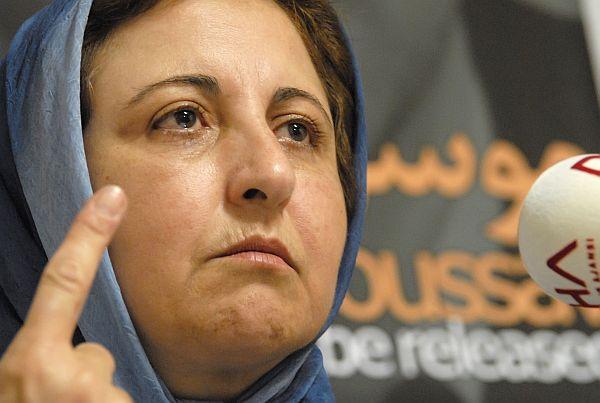Shirin Ebadi: Iranian Women At Green Helm
 Susan notes: this article by Iranian lawye and human rights activist Shirin Ebadi really strikes a chord: amazing women never give up...
Susan notes: this article by Iranian lawye and human rights activist Shirin Ebadi really strikes a chord: amazing women never give up...The protest movement is now a year old – but the feminists at its helm can look back on decades of courageous activism.
This weekend one year will have gone by since the Iranian people took to the streets in droves to protest at the fraudulent elections that returned Mahmoud Ahmadinejad to the presidency. These peaceful demonstrations were met with extreme violence carried out by the Iranian regime. Since that day, the people have not backed down and continue to fight peacefully for basic human rights. Meanwhile, the government continues its crackdown on any opposition or dissent with ever increasing brutality.
Just a few weeks ago, on 9 May, the lengths to which the regime will go to crush its opponents came to light. Five political prisoners were executed in secret. Not even their families or their lawyers were notified.
Shirin Alam Holi, a 28-year-old Kurdish woman, was executed along with four men. In letters from Evin prison, Shirin wrote of being tortured to confess to charges of terrorism. She refused to confess, sealing her fate. At least 25 other men and women await the same fate on death row.
However, as we see time and time again, the harsher the repression, the stronger the movement grows. And as the story of Shirin Alam Holi demonstrates, women are at the forefront of the struggle for human rights in Iran.
But it is interesting to observe that this powerful feminist movement was not born out of the elections. It has been gaining strength and momentum since the Islamic revolution of 1979 – when the regime began imposing laws that were discriminatory against women – and even predates the revolution. Women in Iran have enjoyed the right to vote for nearly 50 years, since 1963. Today, under an even more repressive regime, they are flooding the ranks of doctors, professors and chief executives. Women now constitute more than 63% of university students. Is it any wonder that they refuse to stand idly by and accept that their lives are not worth as much as that of a man?
With no leader or central office, for 31 years the women's movement has resided in every Iranian household that cares about human rights. In the past year, the now famous Green movement has emerged and modelled itself on this seemingly unstoppable force. With women's rights activists at the helm, the Green network of groups and people is consistent in its demands for democracy and human rights.
Take the Mourning Mothers. Every week since June 2009, mothers whose children are in prison, are missing, or have lost their lives in state-sanctioned violence, gather in Laleh Park in Tehran. Dressed all in black, they carry photos of their loved ones and are surrounded by other women who wish to support and protect them.
Every Saturday they gather peacefully and every Saturday the police attack, beat, and arrest them. This excessive violence and repression by the government has sadly become routine in Iran – but has not deterred the Mourning Mothers. Courageously, they are defending their human rights and, ultimately, those of women everywhere.
In December, a wave of arrests and violence followed peaceful protests taking place on the Shia Muslim holy day of Ashura. Dozens of women journalists and human rights activists were targeted, and I was no exception. In an attempt to stop me from doing my work from abroad, the government arrested my sister, Dr Noushin Ebadi. She has never been politically active or participated in any rallies or demonstrations, but was arrested and detained for three weeks solely because of my work fighting for human rights.
This brave group of women will not stop. They prove that there is no end to the creative ways that Iranian women will fight back. The One Million Signatures campaign has been working since before last year's election to collect signatures from Iranian men and women who oppose discriminatory laws and practices. On 11 March the Change for Equality website, which promotes the campaign, was awarded the first ever Netizen prize by Reporters Without Borders. The next day – ironically the World Day Against Cyber-Censorship – Iranian authorities shut down the website for the 23rd time since it was launched in 2006. It was up and running again just hours later.
The struggle for human rights and gender equality continues in Iran as we mark the anniversary of the disputed elections. This global day of action has united activists, students, NGOs and concerned citizens worldwide to spotlight the horrific human rights abuses that have become all too common.
Women will be at the forefront of this weekend's peaceful activities, as they were today and will be tomorrow. Mark my words, it will be women who will bring democracy to Iran.
Click here for the full story:
By Shirin Ebadi
On The Guardian
Copyright: IPS
Related Links:
More About Shirin Ebadi on AWR